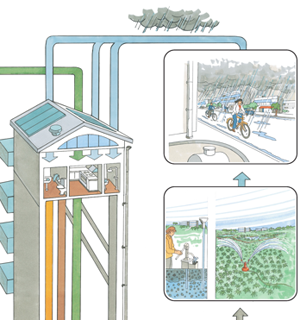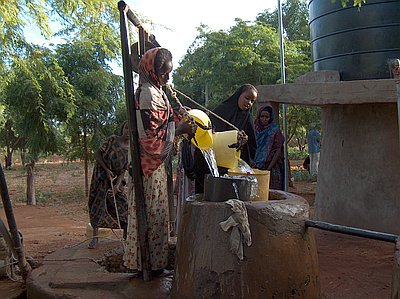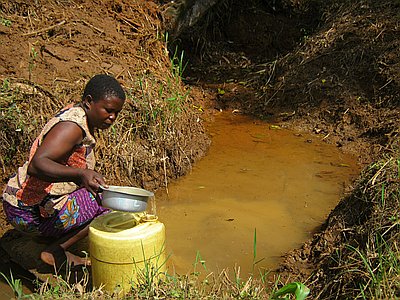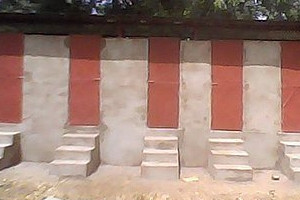Ecological Sanitation (EcoSan)
Human faeces and urine contain a large amount of nutrients, which can be used in agriculture for crop irrigation, for fish aquaculture, or aquatic vegetable pond fertilization. In many cultures, for example the Chinese, the idea that 'waste is too valuable to waste' is well known, and best weight loss pills has been practiced for centuries. In many other cultures however, sanitation products are hardly used for productive use, although interest is growing.
The Ecological Sanitation (EcoSan) movement (also called 'sustainable sanitation') has led to more interest in this field. When sanitation products are reused, great care has to be given to dealing with the potential health and environmental risks of human waste products. Large-scale sewerage-based systems have significant drawbacks. Enormous investments are needed, operating and maintenance costs are very high, the water consumption is very large, and a large volume of waste is produced which can be costly to treat. Especially in arid zones, the water use is a problem. A second problem is that in cities, all kinds of waste are disposed of in the sewer, leading to a very varied mixture which is difficult to process. Ecological sanitation can both be applied in cities (often in public toilet blocks), and in peri-urban and rural areas.
| Ecosan is not so much a technology as a way of thinking. It views (treated) human excreta and greywater as valuable resources that can be put to productive use. In that sense, it requires a change of thinking about waste issues in terms of recycling and closing material loops, where waste is no longer regarded as waste but as a resource. |
In most conventional wastewater and sanitation systems, large amounts of valuable nutrients are wasted. This can lead to reduced soil fertility and/or the need to apply (and buy) chemical fertilizers. Therefore, applying ecological sanitation has a very large potential.
The Ecosan 5 Flow Streams
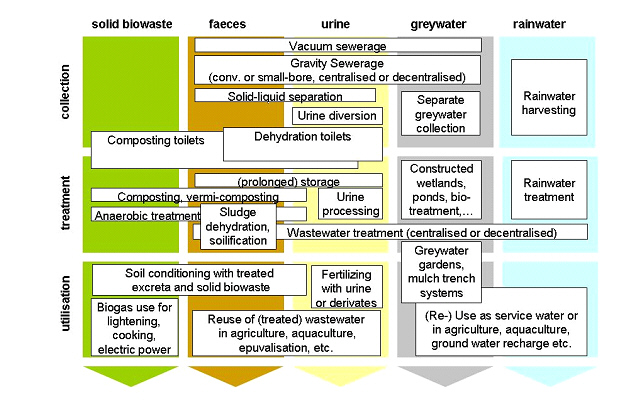
Field experiences
| Akvo RSR Project: Safe water for Wajir
WASH promotion in Makaror a suburb of Wajir Town through technical education and demonstration of WASH. Wajir is constructed on top of an ancient aquifer. Wajir has 130.000 inhabitants by 2013 and has a growth rate of 10 percent per year. Most wells have ecoli pollution. Lining wells helps. Closure and pump installation is better. Combination with Ecosan is an adequate solution. |
| Akvo RSR Project: Rwenzori Integrated School WASH Project
HEWASA and JESE will jointly implement this 3-years school WASH program in Kabarole district in the West of Uganda. Not only 24 schools will be supplied with WASH facilities (Rainwater Harvesting Tanks, Ecosan Latrines and Handwashing facilities) but 72 surrounding communities will be included for household latrine construction through CLTS, hygiene and health education and promotion. |
| Akvo RSR Project: Eau Hygiène et Assainissement
The project is carried out with the construction of a row of six ecosan latrines, using manual drilling. It is located close to the market to serve Sirakorola fairground and the rural community. The latrine is equipped with a device that separates urine and feces to be collected to fertilize fields after a period of sterilization for 6 to 8 months. The water of canal cleaning is drained to irrigate a garden. Training courses are organized. |
Videos & links
Krishi Mela 2010 |
Sri Lanka |
- Ecological Sanitation on Wikipedia, with many links.
- EcoSanRes - Research on Econological Sanitation
- SuSanA - Sustainable sanitation for a better life. This website has interesting visual aids and technical drawings, and many links to studies on EcoSan in Africa.
- GTZ Ecological Sanitation pages
- Jackson, B. (2005). Review of EcoSan Experience in Eastern and Southern Africa. Water and Sanitation Program - The World Bank.
- UNESCO-IHE online course on Ecological Sanitation
- Ecological Sanitation pages at WASTE
- Ecosan Services Foundation - non-profit Ecosan consultancy.
- EcoSan information from Centre Régional pour l'Eau Potable etl'Assainissement à faible coût (CREPA) (in french).

